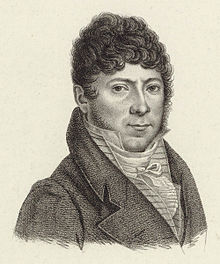Philippe Libon
Philippe Libon (* 1775 in Cádiz ; † February 5, 1838 in Paris ) was a French violin virtuoso and composer of Spanish origin. The French version of his name is more common than his Spanish baptismal name Felipe Libón , as the musician spent a large part of his life in France .
Life
The musical talent of the young Libon was recognized and encouraged by his family at an early stage. Since Spain was not only politically but also culturally in an isolated peripheral location at the end of the 18th century, it was not possible for Libon to study in his home country with a first-class contemporary musician of international repute. At the age of around 15 he finally managed to become a student of the famous Italian violinist Giovanni Battista Viotti in London , at the same time he also took up composition studies with Giovanni Battista Cimador .
Viotti, who was convinced of Libon's outstanding talent, soon introduced his protégé to the music-loving London audience in large concerts. The barely twenty-year-old took part in the London premieres of several string quartets by Joseph Haydn ; Haydn himself, who spent most of the first half of the 1790s in the English metropolis, praised the “excellent reproduction” of his works.
In 1796, when he was around 21 years old, Libon was appointed solo violinist at the royal court in Lisbon , two years later he relocated to his Spanish homeland for a short time because he had been offered the same position at the Madrid court on more favorable terms. Another two years later, in 1800, he went to Paris, where his reputation had already preceded him and where he was immediately enthusiastically received by the public. In 1801 he entered the service of Joséphine de Beauharnais , the wife of the then First Consul and later Emperor of the French, Napoléon Bonaparte .
The dynastic and political upheavals of the following decades hardly affected Libon's prominent position in Parisian musical life: he was taken over by Joséphine's successor, Empress Marie-Louise of Austria , and after the Restoration remained in office under the Bourbons who had returned to power and dignity.
As a composer and violinist, Libon continued the tradition of his teacher Viotti, some of whom he also processed thematic material in his own works. Some of his etudes for violin are still widespread today and have also been arranged for other string instruments . In contrast, his fame as an important virtuoso, like that of so many violinists of his generation, quickly faded from the mid-1820s due to the overpowering influence of Niccolò Paganini .
Libon owned three famous violins, one dated 1591 from the workshop of the Amati brothers Antonio and Girolamo and two instruments by Antonio Stradivari from 1693 and 1729 respectively.
Works
- Six solo concerts for violin and orchestra
- Three trios for two violins and violoncello , op.3
- Three duets for two violins, op.4
- Three trios for two violins and violoncello, op.6
- Recueils d'airs variés for violin and quartet, op.8 and 12
- 30 Caprices for violin solo, op.15
literature
- Eugène Borrel: Art. Philippe Libon in: Friedrich Blume (Hrsg.): The music in past and present . Vol. 8, p. 708, Directmedia, Berlin 2001, ISBN 3-89853-460-X
Web links
| personal data | |
|---|---|
| SURNAME | Libon, Philippe |
| ALTERNATIVE NAMES | Libon, Felipe |
| BRIEF DESCRIPTION | French violinist and composer of Spanish origin |
| DATE OF BIRTH | 1775 |
| PLACE OF BIRTH | Cadiz |
| DATE OF DEATH | February 5, 1838 |
| Place of death | Paris |

